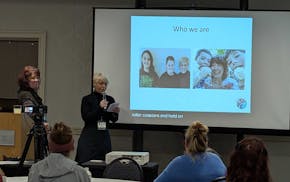In my previous column I tried to bring some order to our irregular use of words borrowed from Latin. For example, curriculum is singular and curricula is plural, so why do we say, "The agenda is," and whatever happened to agendum? Don't get me started.
The problem is that some of the words I listed — such as basis/bases, crisis/crises, criterion/criteria, oasis/oases, parenthesis/parentheses, phenomenon/phenomena, synopsis/synopses and thesis/theses — are borrowed from Greek, as some knowledgeable readers pointed out.
True, "Latin and Greek are close cousins, and many words like these were adopted into the Latin language (even as they were adopted into English much later)," Christopher writes, "but your column is about grammar."
For people like me who are a little rusty on their Greek and Latin, Christopher offers a helpful reminder. "Of course, you can see the pattern," he explains. "The -is ending (as in Minneapolis) and the -on ending [as in criterion] do not line up with the singular Latin masculine (-us), feminine (-a) and neuter (-um) endings you list elsewhere." Good to know.
Vincent, another erudite reader, questions my assertion that algae and alumnae don't rhyme. "Although there was wide variation in pronunciation of Latin," he acknowledges, and although "we know from common spelling variation that ae was in some situations pronounced e (e.g., puelle for puellae)," nevertheless, "in contrived academic Latin, algae and alumnae rhyme." He cites as his source A.G. Rigg's "Orthography and Pronunciation" in "Medieval Latin: An Introduction and Bibliographical Guide."
I love hearing from well-educated people, especially from those who have a sense of humor, as Vincent does. "The English language is delightfully complex and variegated," he writes. "I was once in the British Museum in a reading room and the curator came in and told us that 'there was to be no intercourse' in the quiet study room. You could tell he loved saying that."
Who knew museum curators had so much fun?
Also on the lighter side, Tony came across a juggling baby in an article about Bela Fleck and Abigail Washburn: "Married since 2009, Fleck and Washburn recorded their first duo album … in their home studio in Nashville, juggling Washburn's nursing schedule with the baby." Tony: "The image boggles the mind."
Likewise, I think Terry was having some fun with me when he wrote, "Enjoyed your column on grammer. Have you ever addressed the increasing use of adjectives replacing adverbs (e.g., "Drive safe" instead of "Drive safely")? This drives my wife and I up the walls! Thanks."
And thanks to you for writing, Terry. Just between you and I, you make a real good suggestion for a future column.
You know I know better, don't you (no?)?
In reference to "the increasing disregard for the rules and conventions of English," Carol writes, "Please add to your list the decline of the past participle. … If one of your students needs a topic for a paper, I suggest, 'Is Gone Gone?' "
I think Carol could have went further with that one, don't you?
Stephen Wilbers offers training seminars in effective business writing. E-mail him at wilbe004@umn.edu. His website is www.wilbers.com.

U.S. Bancorp executive stopped responding to control tower minutes before Brooklyn Park crash

Minneapolis condo in historic Midtown Exchange building listed for $205,000

RFK Jr.'s controversial comments draw ire at Minnesota autism convention

Big medical expenses drove $176 million operating loss last year at Medica
